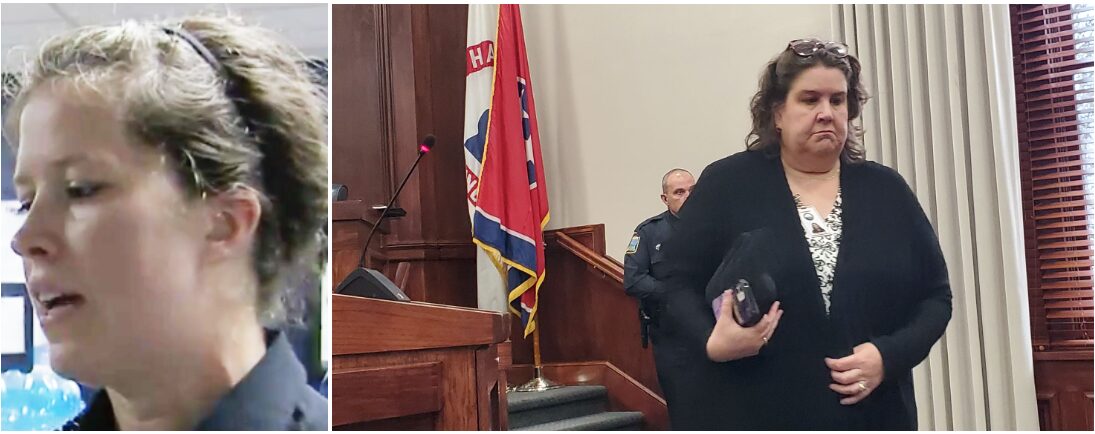
City cop Brandi Siler, left, and Hamilton County magistrate Lorrie Miller run a barretry project creating legal conflicts and criminal cases. (Left photo TVIII right photo David Tulis)
CHATTANOOGA, Tenn., Wednesday, May 1, 2024 — A disputed dog sale is converted into a crime on oath of a cop who is able to swear out an arrest warrant before a Hamilton County magistrate who piles speculation and bias atop of hearsay.
By David Tulis / NoogaRadio Network
Chattanooga police officer Brandi Siler, hearing one side by phone of a dispute between two women over a dog sale using the Venmo app, swears out an arrest warrant for Tamela Grace Massengale, 60, a divorcee, widow and truck crash-injured disabled woman scraping by on $804 from social security.
Mrs. Miller’s doggie door rule lets only select “small” people through an otherwise locked door. These parties, of low stature, are deputies and police officers.
Members of the citizenry cannot get in because the door is locked. We pull at the knob, twist one way, then the other. Nope. Won’t open.
The constitution of Tennessee, said by Thomas Jefferson to be that with the fewest defects, requires the courts be open, that justice be available to all.
The justice in view here is from office of county magistrate, or judicial commissioner. The county commission selects these judges and pays them.
‘Facts tending to establish’
Tenn. const. art. 1 sect. 17, says “the courts shall be open” and that “every man, for an injury done him in his lands, goods, person or reputation, shall have remedy by due course of law, and right and justice administered without sale, denial, or delay.”
Law demands facts underlie arrest warrants.
The magistrate, before issuing the warrant, shall examine on oath the complainant and any witness the complainant may produce, and take their affidavits in writing, and cause them to be subscribed by the persons making the affidavits. The affidavits must set forth facts tending to establish the grounds of the application, or probable cause for believing the grounds exist.
T.C.A. § 40-6-104
I am targeting Mrs. Miller’s policy as unconstitutional and illegal, no matter what good reasons she may have to violate state law at Tenn. Code Ann. § 40-12-104. Application to testify by person having knowledge of commission of offense, and Tenn. R. Crim. P. 3.
I am next friend of the victim in State of Tennessee v. Tamela Grace Massengale. On Thursday I filed “Affidavit and remonstrance in re Tamela Grace Massengale false imprisonment & false arrest; Petition for writ of certiorari” to bring Mrs. Miller to bar and the only means by which to invoke judicial power.
Judicial power is constitutional, and is the power to adjudicate cases, to apply law or equity to facts.
My 8-page motion and supporting exhibits demand the case be yanked out of general sessions court and brought up for disposition the county’s courts of record. These are the circuit court, specifically the criminal division, aka “the criminal court.”
Petition of Tamela Grace Massengale attacks judicial fraud
Mrs. Miller’s policy has invited extraordinary looseness and carelessness. Forbidding the fact witnesses and victims from testifying means that all warrants for the seizure of a person by an officer are hearsay.
Angela Lawton’s claims that Mrs. Massengale had cheated her stand in this case as the only set of facts. Mrs. Lawton gives grievance to city officer Brandi Siler. Officer Siler makes no investigation – convinced about what she has heard. She in good conscience goes to magistrate Blake Murchison, swears out a warrant that Mr. Murchison accepts and signs.
One side. Hearsay second-hand witness. The accused Mrs. Massengale arrested on the road in her car. The car is towed, impounded; Mrs. Massengale lacks funds to redeem it.
Mrs. Miller says her policy “avoids problems.” But it violates the constitution and the rules of criminal procedure. Warrants must arise from the best possible evidence.
The affidavit of complaint is a statement alleging that a person has committed an offense. It must: (a) be in writing; (b) be made on oath before a magistrate or a neutral and detached court clerk authorized by Rule 4 to make a probable cause determination; and (c) allege the essential facts constituting the offense charged.
Tenn. R. Crim. P.3
Law prevents arrest warrants under fraud
If Mrs. Lawton is aggrieved at paying a deposit of F$400 for an $800 great dane, and changes her mind, she must swear out a crime has been committed. If she is a true crime victim, the law demands her best evidence. It demands her oath.
It appears “Mrs. Lawton” is a scammer using the Venmo app and its “funds on hold” feature to scam sellers. Mrs. Lawton made three payments or dog deposit on Venmo, and instantly on completion belligerently demanded a full refund, which would have included the $400 she paid, plus the F$200 on hold with Venmo. She would have netted F$200 profit, with police department threat absorbed as fact by police dupe Siler.
Best evidence, not merely doggie door entrance to the magistrate.
Yes, sometimes cops and deputies are fact witnesses. It is proper they testify before the magistrate under examination and obtain an arrest warrant.
One effect of Mrs. Miller’s policy is insertion of atheism into a vital legal and justice function. An officer’s oath has limited value because he has no first-hand knowledge. An oath of a crime, as in this case, is an oath on a fabrication and a well-told tale, with only one side in view.
Dishonorable cops pursue barretry
The doggie door policy is surreal, allowing into court those parties notorious for lying, planting evidence, “testilying” as a matter of honor, integrity, faithfulness and camaraderie among LEOs. Police generate crime. Hearsay-only doggie door doctrine arrest warrants create grief and disturbance.
Doggie doors for those of low moral stature and unreliable as to facts. A locked main door to the people themselves, the good and the bad – the latter ferreted out under the rules by the magistrate’s examination. Miss Siler and Mrs. Miller are barretors, “a common mover, exciter, or maintainer of suits and quarrels either in courts or elsewhere in the country; a disturber of the peace who spreads false rumors and calumnies, whereby discord and disquiet may grow among neighbors” Black’s Law Dictionary, Rev. 4th Ed.
The damage is incalculable. Poison and dread. Public loss of confidence. The poor pillaged. Rising visceral uncertainty among poor and lower-middle class people like me. Rape victim D.R, pallet businesswoman Shameca Burt, truck driver Michael James and disabled pensioner Mrs. Massengale are plenty of evidence that doggie door rules “cause problems” more than the law would cause.
Mrs. Miller’s breach of law denies a vital promise in the constitution.
Section 7. That the people shall be secure in their persons, houses, papers and possessions, from unreasonable searches and seizures; and that general warrants, whereby an officer may be commanded to search suspected places, without evidence of the fact committed, or to seize any person or persons not named, whose offences are not particularly described and supported by evidence, are dangerous to liberty and ought not be granted.

